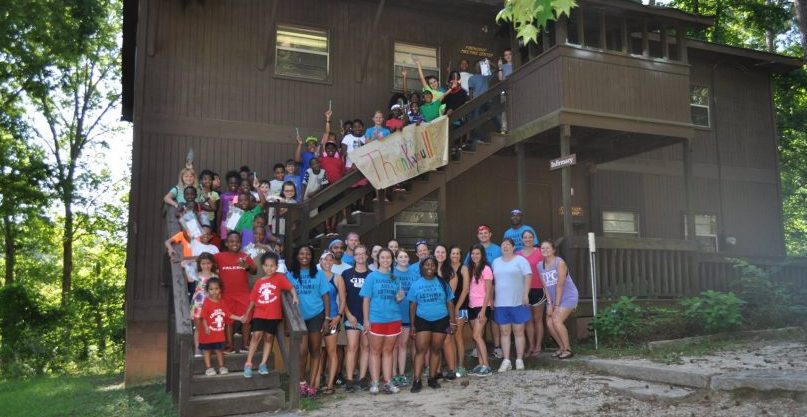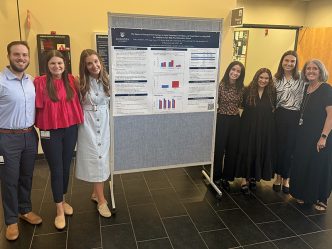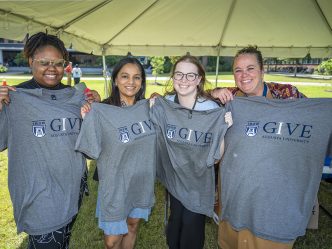What do gold medalist swimmer Kelsi Worrell and legendary track and field star Jackie Joyner-Kersee have in common?
If asthma wasn’t your first guess, you’re not alone. For decades, the chronic inflammatory disease – often seen as a limiting factor to exercise and physical fitness – has been viewed as a disability. Today, roughly 8 percent of Americans, around 25 million people, suffer from asthma. That same percentage holds true even among the world’s most elite athletes.
In Georgia, child asthma rates are 16.2 percent, over double the national average and Augusta has been ranked as one of the 10 worst Asthma cities in the country.
Those figures beg an important question: What give us such a bad rep?
One aspect is a lack of education. So says Kitty Hernlen, associate professor of respiratory therapy and director of the annual Augusta Area Asthma Camp.
“Asthma isn’t a limiting factor for exercise or physical fitness today because we have the medication to treat and manage it,” she said. “Asthmatic children should be no different than anyone else when it comes to physical activity.”
That’s the ultimate takeaway of the university’s day camp. Started in 2012, the free weeklong camp provides a safe, educational space for local children suffering from asthma to learn more about treating and, more importantly, managing their disease. For many of the children, camp is the first time their parents allow them to participate in sports activities such as swimming or hiking. This year, the camp will attract dozens of local children with asthma, a success Hernlen attributes in part to the positive message campers take away from their experience.
“We teach them about their asthma and how to manage it with medication and monitoring, but we are also there as a regular camp,” Hernlen said. “That allows the kids to do physical activities under the guidance of respiratory therapy students, faculty and nurse volunteers, and it also gives them a chance to see that they can do whatever they want as long as their asthma is managed properly.”
In addition to learning about the anatomy of the lungs, children are taught how to use peak flow meters – handheld devices that measure how well air exits the lungs – and holding chambers –inhaler attachments that trap and hold asthma medication once dispensed, allowing it to be breathed in slowly.
Campers enjoy learning about how to manage their disease, but they enjoy another aspect of camp even more. Swimming.
“It’s good physical activity,” said Dr. Gina Besenyi, assistant professor in the Department of Clinical and Digital Health Sciences and director of the Physical Activity Research in Community Settings Lab (PARCS). “Even for the kids who weren’t the best swimmers, it doesn’t slow them down a bit.”
Besenyi, whose research into active living behaviors contains a strong community focus, said that beyond providing a satisfying camp experience for local children, the asthma day camp is also a great opportunity for community health research.
“Last year, we added an evaluation component where we gave the children surveys to see if they were learning about their asthma and asked the parents some questions about whether they felt like their child’s asthma was more controlled. We also wanted to understand how much physical activity children were getting by participating in camp.”
The results from last year’s evaluation show that camp significantly increased children’s physical activity levels.
“They weren’t thinking about having asthma or trying to be healthy,” Besenyi said. “They were just playing and having a good time.”
Children also showed increased knowledge about asthma, although more work needs to be done.
“Sometimes kids need to hear things multiple times for it to sink it,” Besenyi said. “That’s why this annual camp is so important. It gives kids the opportunity to come back every summer and learn and play with their peers.”
On top of getting great results from campers, Besenyi and Hernlen have also gotten some great feedback from parents. One parent noted that their child enjoyed being around other children with asthma. Another said their child looks forward to the camp every year.
“He does not feel singled out,” they said. “He is around other kids like him.”
In the end, the success of the Augusta Area Asthma Camp rests on the strength of a promise. Or rather, three promises.
Hernlen jokes, “I make three promises every year at orientation. One, the children will learn about asthma; two, they’ll have fun; and three, they will come home tired. I have kept that promise every year.”
The 2017 Augusta University Asthma Day Camp is sponsored by the W.G. Raoul Foundation. Peak flow meters and holding chambers were provided by Monaghan Medical.
Email Kitty Hernlen for more information about the Augusta area asthma camp or to volunteer for next year’s camp.
 Augusta University
Augusta University




